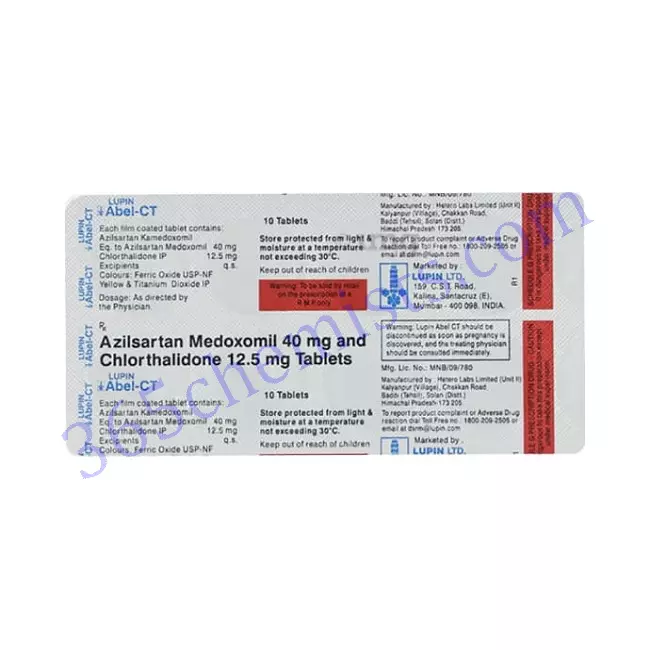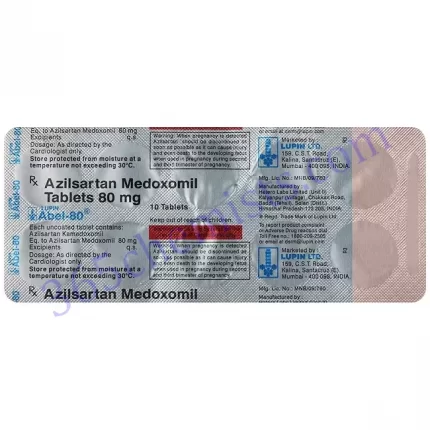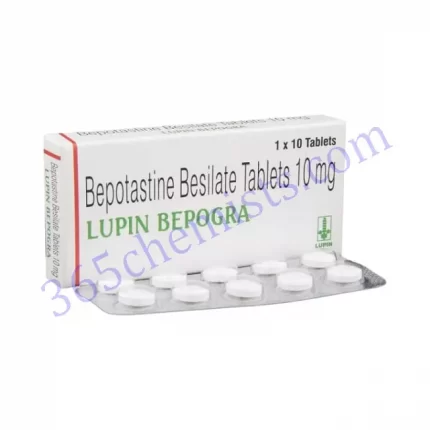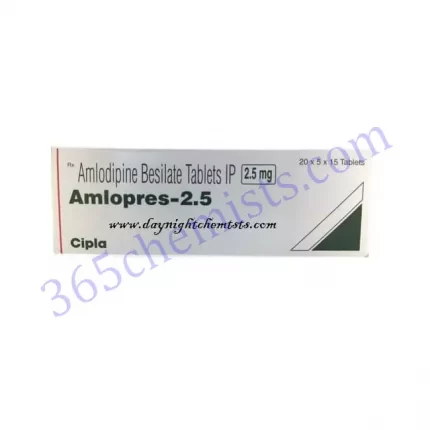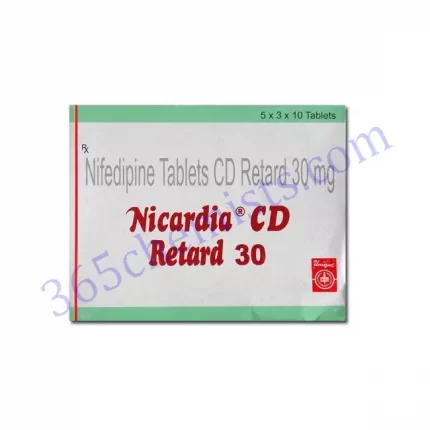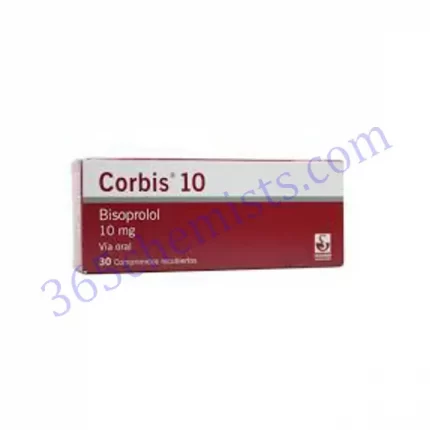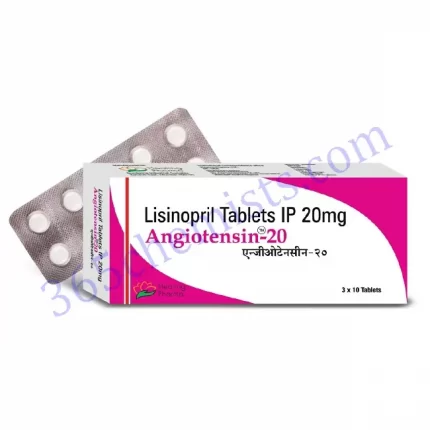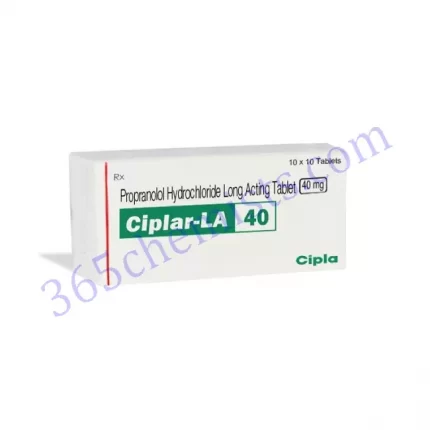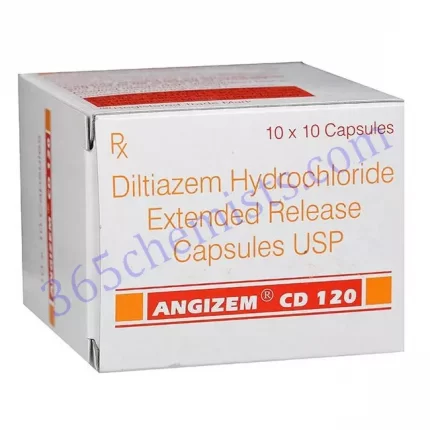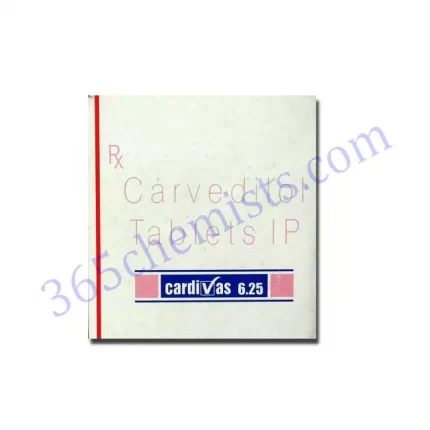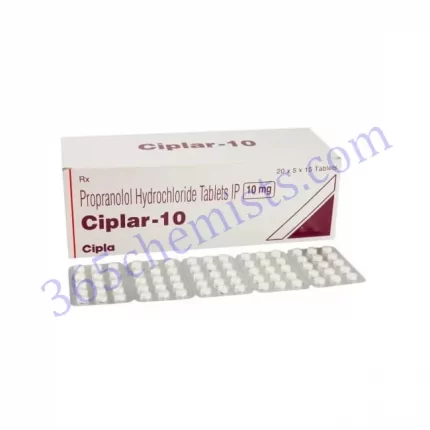Abel-CT Tablet (Azilsartan medoxomil 40mg/Chlorthalidone 12.5mg): An Overview of the Combination Medication
Azilsartan medoxomil and Chlorthalidone are the two active components that can be found in a single dose of the combination drug known as Abel-CT Tablet. The treatment of hypertension, often known as high blood pressure, frequently calls for the use of this particular medicine. In the following paragraphs, we will present a detailed explanation of the Abel-CT Tablet, including topics such as its applications, dosage, potential adverse effects, and safety considerations.
What is Abel-CT Tablet?
Abel-CT Tablet is a drug that can be used orally and comes in tablet form. Each tablet provides 12.5 milligrammes of chlorthalidone in addition to the 40 milligrammes of azilsartan medoxomil. Azilsartan medoxomil is a type of medication known as an angiotensin II receptor blocker (ARB), and chlorthalidone is a type of diuretic known as a thiazide-like. Both of these drugs work in different ways to lower blood pressure, making them an effective combination for treating hypertension.
Uses of Abel-CT Tablet
The primary indication for the use of the Abel-CT Tablet is for the control of hypertension. A condition known as hypertension is characterised by consistently high levels of blood pressure over a long period of time. Abel-CT Tablet serves to lower blood pressure by relaxing blood vessels and reducing fluid volume through increased urine production. This is accomplished by the combination of Azilsartan medoxomil and Chlorthalidone, which is found in the tablet.
Dosage and Administration
It is possible for the recommended dosage of Abel-CT Tablet to change depending on the individual’s ability to regulate their blood pressure, their reaction to treatment, and various other factors. It is essential to take the medication exactly as directed by the healthcare professional, including adhering to the dosage that has been prescribed. Oral consumption once a day, either with or without meals, is the recommended way to take the tablet.
It is recommended to measure blood pressure on a consistent basis in order to determine how effectively Abel-CT Tablet works. It is extremely important to take the medication at the prescribed times and not to stop taking it all of a sudden without first discussing this with your doctor or other healthcare provider.
Related Product
Abel 40 Tablet
Abel 80 Tablet
Abel CT Tablet
Side Effects and Precautions
Abel-CT Tablet, like any other medicine, has the potential to cause negative effects. The following are examples of common adverse effects:
- Azilsartan medoxomil: Azilsartan medoxomil is known to have a number of potential adverse effects, some of which include dizziness, headache, diarrhoea, and fatigue.
- Side effects of chlorthalidone may include increased urination, electrolyte imbalances, dizziness, and muscle cramps. Chlorthalidone is a medication that is used to treat hypertension.
It is essential to get in touch with the healthcare practitioner as soon as possible if any of these unwanted effects continue or become worse. Rarely, the Abel-CT Tablet has been known to cause more serious adverse effects, including allergic responses, issues with the kidneys, and problems with the liver. Seek immediate medical assistance if you have symptoms such as yellowing of the skin or eyes, difficulty breathing, swelling of the face, lips, tongue, or throat, or any other symptom that suggests an allergic reaction.
Before beginning treatment with Abel-CT Tablet, it is imperative that you discuss any preexisting medical problems, medications that you are currently taking, or allergies you have with your healthcare practitioner. It is possible for some medical conditions and medications to interact with this combination medication, which could have an effect on how well it works or could increase the likelihood that it will cause unwanted side effects.
Mechanism of Action
Azilsartan Medoxomil: Azilsartan medoxomil is classified as an angiotensin II receptor blocker (ARB), which is a group of medications. It accomplishes this by inhibiting the action of angiotensin II, a hormone that is responsible for the narrowing of blood arteries. Azilsartan medoxomil works to lower blood pressure by inhibiting the angiotensin II receptor. This, in turn, helps to relax and dilate blood vessels, which results in a reduction in peripheral resistance.
Chlorthalidone is a thiazide-like diuretic that works on the kidneys to increase the amount of salt and water that is excreted from the body. Chlorthalidone is referred to as chlorthalidone. Chlorthalidone’s ability to stimulate diuresis contributes to a drop in fluid volume as well as an overall reduction in blood volume. Because of this, one’s blood pressure drops as a result.
Important Considerations and Precautions
Individualised Dosage The dosage of the Abel-CT Tablet should be decided by the healthcare provider depending on the individual’s ability to control their blood pressure, their reaction to treatment, and any other relevant circumstances. It is essential to take the medication exactly as directed by the healthcare practitioner and to completely adhere to the dosage that has been recommended. It is recommended to perform routine monitoring of blood pressure in order to determine how effectively the medicine is working.
Interactions with Other Medications The Abel-CT Tablet may have interactions with a number of other medications, including nonsteroidal anti-inflammatory drugs (NSAIDs), lithium, and certain medications that influence potassium levels. Because of these interactions, the drug may not work as well or the patient may be more likely to experience adverse effects. It is imperative that the patient disclose all drugs that they are currently taking to the healthcare professional in order to prevent any potentially harmful interactions.
Caution should be exercised during pregnancy and during breastfeeding. The Abel-CT Tablet should be avoided during pregnancy in general, but especially during the second and third trimesters, because it could cause harm to the foetus that is developing. Because of the possible health consequences for the child, it is also not advised to be done during breastfeeding. During these times, the healthcare practitioner ought to be informed in order to receive direction concerning the proper administration of hypertension treatment.
Patients with renal impairment may require dosage changes or close monitoring while taking Abel-CT Tablet. Patients with renal impairment may also be at a higher risk for adverse reactions. The healthcare practitioner will evaluate the function of the kidneys and provide advice tailored to ensure the drug is used in a manner that is both safe and effective.
Conclusion
A combination drug called Abel-CT Tablet (Azilsartan medoxomil 40 mg/Chlorthalidone 12.5 mg) is prescribed for the control of hypertension. It successfully lowers blood pressure and improves cardiovascular health by combining the actions of a diuretic and an angiotensin II receptor blocker. A successful treatment of hypertension with Abel-CT Tablet requires strict adherence to the recommended dosage, consistent monitoring of blood pressure, and open and frequent communication with the attending physician or other healthcare professional.

